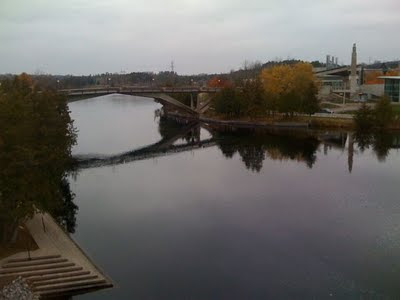The way the river flows

I am sitting in the Bata Library at Trent University and I have deliberately chosen a seat on the side of the library that I remember best, a seat suspended over the Otonabee River. As I begin to write about flow, my eye is caught by patterns moving on the river below. It is raining, and the rain spatters while the river flows, and there are disruptive swirls of foam making patterns on the river’s surface. At first glance, the picture is still, a portrait in shades of gray as my memories of Trent are of grey (my back is to the Peter Gzowski residence. I like that is is hugely yellow, a determined effort to bring sunshine, however artificial, into the gloomy grey of the academic year). But it only takes a second glance to notice that the picture is a pattern of constant and ever-changing flow. I know that flow can be dangerous. In my first year, a friend drowned in that flow. It’s a powerful current. It’s a current that runs through my life powerfully, connecting the self who sat he